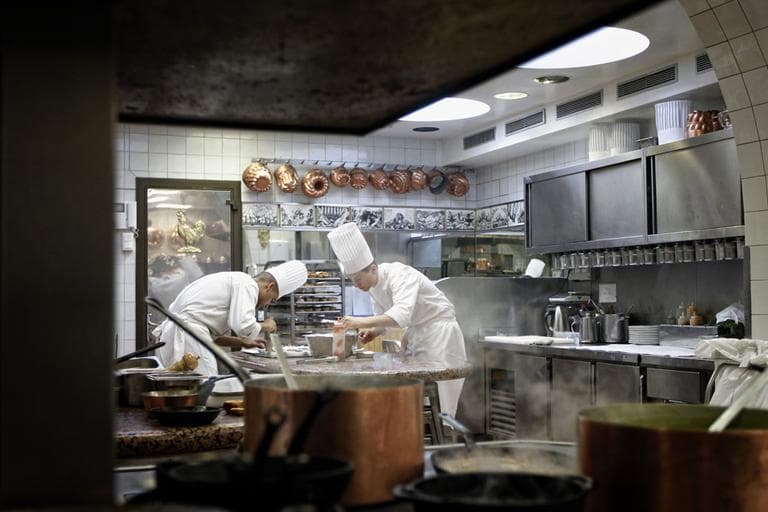Advertisement
The Making of a Chef
ResumeSo you want to be a chef? We take a cook’s tour of the tough road through the venerable Culinary Institute of America.

In New York’s Hudson River Valley, there are two famed institutions. Both instill discipline, expect perfection and weed out the weak. The first is West Point. The second, is the Culinary Institute of America.
Enter CIA’s hallowed halls, and get ready for culinary boot camp. Writer Jonathan Dixon signed up. He chopped onions for hours, got beaten down and whipped into shape.
His confidence fell faster than a soufflé. The making of a chef, he learned, is not for the weak . To make it through requires a warrior’s mindset.
This hour, On Point: The Making of a Chef.
-Bob Oakes
Guests:
Jonathan Dixon, author of "Beaten, Seared and Sauced: On Becoming a Chef at the Culinary Institute of America"
Sara Moulton, chef and cookbook author. She is a graduate of the Culinary Institute of America
Also, this hour:
In this college graduation season, we’re going to be airing excerpts from notable commencement addresses from around the country.
Last Saturday, NPR science correspondent and Radiolab co-host Robert Krulwich addressed the graduating class of the University of California Berkeley Graduate School of Journalism.
He said he understood the job market may look daunting, but not to fear for the future.
MORE:
Excerpt: "Beaten, Seared and Sauced"
By Jonathan Dixon
 I don’t think anyone realized how easy Coyac had gone on us the first few days. We’d been ready on time the initial day because the menu was so basic, but as class went on, we’d opened late for service three or four times in a row, and Coyac’s temper was beginning to fray.
I don’t think anyone realized how easy Coyac had gone on us the first few days. We’d been ready on time the initial day because the menu was so basic, but as class went on, we’d opened late for service three or four times in a row, and Coyac’s temper was beginning to fray.On frying day he swooped in like a Valkyrie.
Frying was a little trickier than roasting or poaching or sautéing— each of those corresponding dishes could be done a little bit ahead, and the roasted beef or chicken, the salmon or sole, the chicken breast with fines herbes sauce could be reheated when it came time to plate. The fried dishes needed to be done almost to order; the panfried pork cutlets our team was cooking had to be started just a couple of minutes before service began and cooked steadily until they were gone. They needed to be breaded just before cooking, and the oil would need to be changed out at least twice. It wasn’t an insurmountable schedule, but it did require some timing. Plus, we needed to make a sauce to go with some green beans, and cook spaetzle.
The spaetzle, Coyac said, needed finesse. The batter needed to be just right. It needed to go into the boiling water in the proper quantity so we could make enough of it to serve and serve it on time, but not so
much that the water lost its boil and made the spaetzle soggy. After it was drained, the spaetzle would be sautéed in butter until browned perfectly. Seasoning was essential. When he walked us through it, the
instructions sounded more like warnings.
Carlos and Joe were working on the vegetables and the pork. Joe pounded the cutlets thin, and Carlos trimmed the beans. I got the sauce going—vinegar, shallots, and wine reduced and then added to a measure of sauce espagnoles, seasoned, and finished with a good chunk of butter. Sean gathered up what we’d need for the spaetzle and when he’d gotten everything, I joined him.
Coyac was at our side before we even started mixing. “You guys work like pigs,” he said. “Look at this,” he said as he gestured at our table. There was flour all over the place, green bean tips scattered across the table surface, piles of crumpled plastic that Joe had used for the pork, rogue pieces of shallot, and an empty container of wine vinegar on my cutting board. “I don’t care if it’s all your mess”—he pointed to Sean—“or none of your mess, but you do not let your station get like this.” He looked at me. “What’s the matter with you? How can you work like this? Do you live like this at home?”
He moved to Joe. “Why is this pork still out? Put it away. Put it away. Now! Come on, let’s go. Where’s the spaetzle batter? You haven’t done it yet? Oh, for God’s sake. For God’s sake. Come on! Why is that sauce at a boil? You know what ‘simmer’ means? What does it mean? Tell me.” I opened my mouth and then closed it. “Okay, we can look it up after you turn the heat down. What? Do you need an invitation? Turn it down! It’s probably burned already.” He walked away, then turned back. “Before you do one more thing, clean that table. Wash your cutting boards, wipe that table down. Change your bainsmarie. There’s no way you’re going to be ready for service. I can’t believe this.”
(Excerpted from Beaten, Seared, and Sauced by Jonathan Dixon. Copyright © 2011 by Jonathan Dixon. Excerpted by permission of Random House, Inc. All rights reserved.)
This program aired on May 13, 2011.